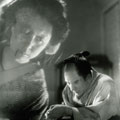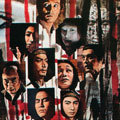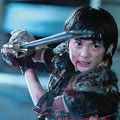Future Film Festival 2006 will dedicate a tribute to the rich Japanese tradition of ghost movies, looking for the roots of famous contemporary movies as Ring, Dark Water or Spirited Away.
Future Film Festival will show movies tracing the origins of Japanese horror movies, as Kaidan Botan-doro and two screen adaptations of the Yotsuya Kaidan’s legend, looking for one of the last icons at the end of the 20th century: Sadako, the frightening and tormenting main character of Ring. Future Film Festival 2006 will show also movies about the unknown tradition of oral tales about Yokai, the spirits of nature and things, as the classic Yokai Daisenso. Then it will be shown also Kwaidan by Kobayashi Masaki: Kwaidan is the opus magnum of one of the main directors of the story of the Japanese cinema. It is a difficult film to classify: there are elements of horror and the supernartural, but Kwaidan is also a romantic film infused with great passion, expressionist and rich of colours, it is a movie which had inspired Paul Schrader for the movie Mishima and Kurosawa Akira for the movie Dreams.
At Future Film Festival there will be shown also contemporary movies as Kairo di Kurosawa Kiyoshi, a new horror masterpiece and the very new Yokai Daisenso by the cult director Miike Takashi, the movie is a contemporary remake of the 1968 classic.
The retrospective is edited by Luca della Casa and Carlo Tagliazucca.
The movies:
Kaidan Botan-doro (The Bride From Hell)
by Yamamoto Satsuo, 1968
During the O-Bon traditional holiday, the deads day, a man falls in love with a beautiful girl. The man immediately realizes that the girl is a ghost and that their love story will take him to death but the attraction is fatal and it’s impossible to be broken. One of the most great love stories never on screen before, the movie is macabre and romantic at the same time. The movie is touching and tormenting as Pandora or A Chinese Ghost Story or Rouge.
Yotsuya Kaidan (The Yotsuya Ghost Story)
by Kinoshita Keisuke, 1949
Iemon, the unemployed Samurai, kills his wife Oiwa, to get married with a wealthy woman. Oiwa’s ghost comes back to torment Iemon and she will take him to suicide. The movie is based on a classic kabuki directed by Kinoshita Keisuke, one of the most important Japanese directors. Yotsuya Kaidan is absolutely one of the best adaptation of the story. The march to tragedy is inexorable and describes every aspect of the characters becoming really a moral tale.
Yotsuya Kaidan (The Yotsuya Ghost Story)
by Misumi Kenji, 1959
The daughter of a wealthy family, Oume, falls in love with a samurai, Iemon, and kills his wife Oiwa. Iemon want to take avenge of the murder but Oiwa’s ghost wants to make justice for herself. The action director Misumi Kenji, known for the series of Zatoichi, Lone Wolf and Club, plays the Oiwa’s legend, changing the frame: Iemon is not a killer but a deceived hero. Horror, action and melodrama mingle each other with energy in one of the best imaginary Japanese movie.
Kwaidan
by Kobayashi Masaki, 1964
This film contains four distinct, separate stories switching between imaginary and horror: after many years a man comes back home and finds out that his wife is a ghost; a wayfarer is saved by a misterius woman coming from snow who gets married with him on these terms: he mustn’t tell about their extraordinary relationship; a blind musician plays in front of a ghosts court and fights for his soul; a man sees a face trapped in his cup of tea and swallows the soul…. The director, Kobayashi Masaki, is known for the moral movie about samurai as Harakiri e The last Samurai, Kwaidan is one of the most many-coloured experience that it’s possible to make at the cinema. Kwaidan is a expressionist masterpiece able to create new worlds.
Yokai Daisensou (Yokai Monsters 1: Spook Warfare)
by Kuroda Yoshiyuki, 1968
Daimon, the gigant Babylonian daemon, takes possession of the Izu’s body, the governor. Kappa, a peaceful water daemon, is the only to know Daimon’s real indentity. Kappa collects a small army of ghosts and daemons and fights Daimon to save the world. During the years in which Godzilla and the gigant monsters triumph, Daiei company reacts to the power of Toho company with the saga of Yokai, the spirits of Japanese folklore, and it creates an extraordinary reverie made of three chapters. Yokai Daisenso is the best chapter of the serie and it’s the most incisive and poetic.Yokai Daisensou (The Great Yokai War)
by Miike Takashi, 2005
A child is involved in a war between a very powerful daemon and the Yokay’s people. He will be forced to take very important decisions to defend himself and the world. Yokai Daisenso is a delirious and totally different remake of the movie realized on ‘68. Tkanks to this movie, Miike Takashi, the iconoclast director, realizes for the first time a movie for families with high budget. Miike realizes a dark story with a lot of deads and little distrurbing details but at the same time he realizes a joyful and anarchic story: his Yokai characters are able to change a mortal war in a ridiculous and cathartic party through violence and acrobatics. A really wondering cinema.
Hausu (House)
by Obayashi Nobuiko, 1977
Seven girls decide to spend their holiday at one of their aunt old house. The house has a dark and alive secret. Little by little the girls understand to be in a mortal trap. Hausu is the well-know movie by Obayashi Nobuhiko and it’s a macabre pastiche full of dark humour that mixes together Japanese horror icons, like mirrors and locks, and western gothic topoi about possessed houses. The style used by the director is baroque, cartoon and spatter at the same time, it advances the postmodern contaminations of the american screen by Hooper, Raimi, Gordon e Zemeckis.
Kairo (Pulse)
by Kurosawa Kiyoshi, 2001
A misterious virus is expanding in the world by internet: people die one by one and they leave only a green spot. The world is becoming empty and only sick gosths continue to exist asking for help. Kairo is the top of new horror after Ringu and it’s the masterpiece by Kurosawa Kiyoshi, a sort of catastrofic movie, dominated by emptiness.




